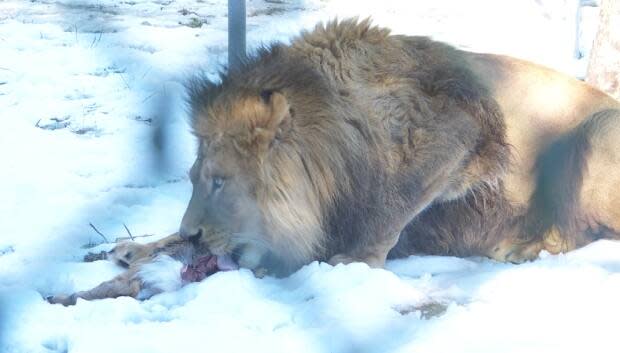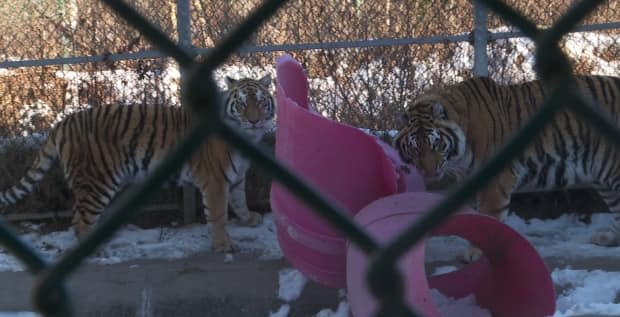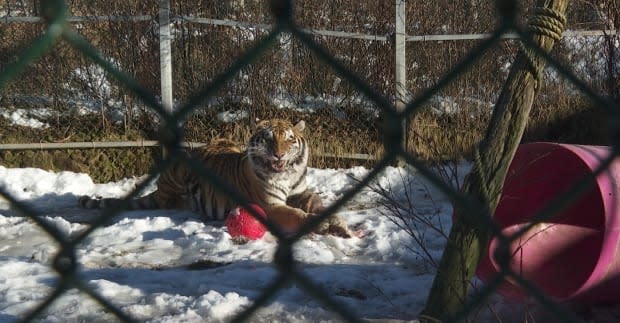Two snakes and four big cats are all that remain of the Cherry Brook Zoo

Almost nine months after it closed its doors permanently, Saint John's Cherry Brook Zoo still has six inhabitants waiting to go to their new homes.
All that remains of the once-bustling zoo are two lions, two tigers and two snakes.
All six have found new homes, but the hold-up is with the four big cats, explains zookeeper Erin Brown, who has been overseeing the relocation of the zoo's animals.
Because they're going to the United States, there's a complicated permit process that often takes six to 12 months, explained Brown.
Essentially, the zoo has to prove that the big cats were legally obtained, and that their transfer follows all of the guidelines laid out under the Convention on the International Trade in Endangered Species (CITES).
Brown said all of the permits required on the Canadian side of the border have been obtained. The hold-up is in the U.S.

She said the COVID-19 pandemic and political unrest south of the border may also have contributed to the delay.
"It could be making policies move a little more slowly," she said.
When the zoo announced it would close for good last May, there were 80 animals — from 35 different species — living at the zoo, and all had to find new homes, said executive director Martha McDevitt.
She said staff spent a lot of time checking out prospective new homes to make sure the animals would be safe and well cared for.
"It was a big task," said McDevitt.
The zoo had a number of farm-type animals, like miniature donkeys, goats and pigs that went to hobby farms, mostly in New Brunswick.
The more exotic animals required a bit more work and they're now spread out at facilities from Nova Scotia to Vancouver.
"The big cats were the hardest to find homes for," Brown said.
The first step was to notify Canada's Accredited Zoos and Aquariums, an accreditation and advocacy group better known as CAZA.
But there weren't any facilities in Canada willing or able to take the big cats. Brown said they eventually started reaching out to sanctuaries, although that wasn't her first choice for the felines.
That's when they heard from Popcorn Park in New Jersey, which is part zoo, part sanctuary. The facility has agreed to take the lions and has lined up a new home for the tigers, since it already has a number of tigers.
So, until the proper permits are ready to go, the four big cats will remain in Saint John.
For McDevitt, they're the hardest animals to say goodbye to.

"You can't help but create these special bonds with these animals, especially specific ones," she said outside the tiger enclosure Tuesday morning.
"For me personally, it's the big cats, the tigers. When I was a little… child, I wanted to be a tiger when I grew up.
"That's impossible, I found out. So being able to work with them has been an absolute dream come true."
McDevitt has been with the zoo since 2016 and the lions arrived shortly after she did.
The tigers have been at the Cherry Brook Zoo since the summer of 2017. All four were hand-raised at an Ontario zoo before it closed in 2016.
"So seeing them leave — and especially them going across the border — is really hard because I may not ever see them again. So that's been hard," said McDevitt.

And because they were hand-raised, Brown said the big cats actually like people.
"They love interacting with visitors," she said.
It was a factor zoo staff considered when they looked at facilities willing to take them.
"We had several facilities that offered space as a sanctuary situation, but we chose Popcorn Park because they're going to be in a zoo situation. A lot of these sanctuaries are really more suited to cats that don't like people."
She said cats that come from abusive or neglectful situations prefer to live a quiet life with as little human interaction as possible.
"But our cats love human interaction. They love seeing visitors. So choosing Popcorn Park was on purpose so that they could have that interaction with visitors."
Once all the permits are in place, Popcorn Park will send its own relocation team to fetch the felines. They'll have specialized equipment and people, including a veterinarian.

They have specialized cages with wheels that will be rolled right up to the door of their enclosure, and with a little food inside the crate as an added incentive, they cats should go in and be ready to be loaded into a specialized trailer for the ride to New Jersey.
In the meantime, thanks to monthly donors who continue to contribute to the zoo — and the occasional one-time donation — life goes on for the big cats.
With fewer animals to tend to, staff members have a bit more time to hand-feed and train the cats.
With her bucket of cut-up deer meat, zookeeper Megan Gorey puts the lions, Aslan and Frieda — littermates who were born in 2014 — through a series of behaviours that she doesn't like to call tricks.
The cats sit and lie down, and offer the correct paw on the fence as instructed. They also stand on their hind legs on command — all for a treat, of course.
Gorey also demonstrates how she can draw blood and give injections with Luna, a five-year-old tiger who's been at the zoo since 2017. From the safety of the other side of the fence, Gorey tells Luna to lie down along the fence and as someone else feeds her meat treats, she barely reacts when the needle is used.
Long goodbye
Brown said she initially worried that a long delay before some of the animals left would be a painful way to say goodbye, but she's actually grateful for it now. She said each animal was able to get fussed over and given extra attention before they departed for their new homes.
And with the four cats being among the last to go, it gave staff extra time with the zoo's most popular inhabitants — who just happen to be the biggest eaters as well.
McDevitt said it costs a couple hundred dollars per cat per month — and that's even with the donations of roadkill from the Department of Natural Resources. One such donation just happened to arrive Tuesday morning and zookeepers were preparing to hoist entire deer legs up on poles in the cat enclosures to allow them to hunt and earn their meal.
Once the big cats leave the Cherry Brook Zoo, the snakes will go as well, said Brown.
The snakes will go home with one of the zookeepers, but as long as the zoo remains open for the lions and tigers, the snakes will stay as well.

